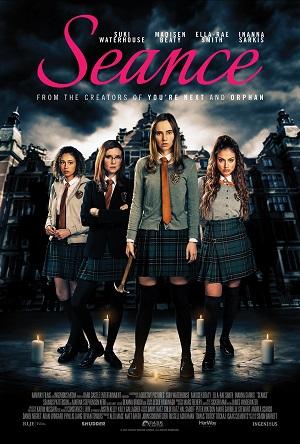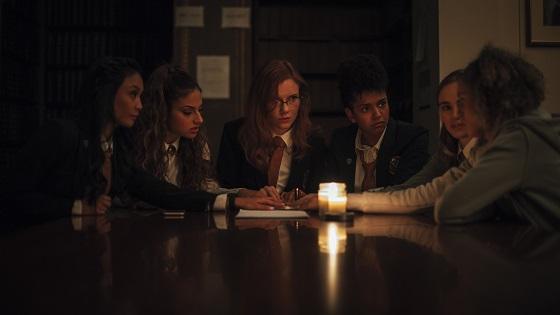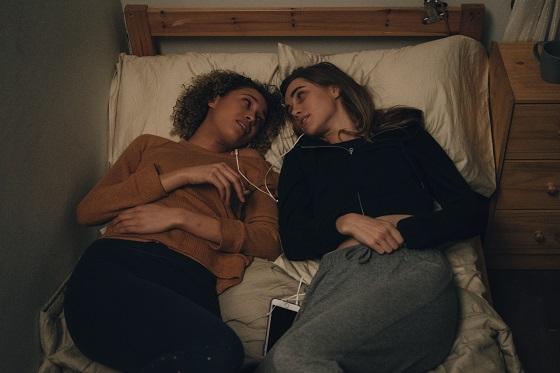
In theaters, on digital, and on demand Friday, May 21

[Rating: Minor Rock Fist Up]
Curses and ghosts and boarding schools: oh my! A neo-gothic mix of Mean Girls and Dead Poets Society with a Candyman base, Séance has a lot of fun playing within a genre sandbox while also subverting its more typical expectations. And while it pushes the bounds of its narrative limitations at times, strong performances from the leads and a confident eye behind the camera connect enough dots to bring the larger effort across the finish line, albeit with a bit of a limp.
When a group of seniors at the prestigious Edelvine Academy for Girls attempt a late-night séance to scare one of their classmates, things go bad and the prank victim takes a fatal header out of her top-floor window. A short time later, transfer student Camille (Suki Waterhouse) starts at Edelvine mid-semester, occupying the room of the deceased student after receiving a frosty reception from the headmistress, Mrs. Landry (Marina Stephenson Kerr), along with the clique-happy students. But it’s not just new girl jitters that’s giving Camille fits, with strange vibes in her dorm room leading to flickering lights and now-you-see-me/now-you-don’t ghosts appearing in the shadows.
The central conceit of the plot revolves around the slow-burn discovery of what’s really going on at the school, because whether it is a séance-summoned ghost, the unusually cruel classmates who may or may not have summoned it, Mrs. Landry, or Mrs. Landry’s weird son: someone or something is killing students at Edelvine. Once the girls from the opening séance start dropping in dark, misty settings where they’ve been separated from the pack, it’s a race to the movie’s finish line to figure out what is going on at the small boarding school. And truth be told, it unfolds with ease and is a fun throwback to the slasher genre’s 80s heyday.

Indeed, at just 90 minutes Séance is a tidy, compelling watch, and to his credit writer/director Simon Barrett carves out some time to explore themes related to bullying, budding sexuality, and genre reflexivity as well. This last point is an important one, as Barrett seems to have a firm grip on the archetypes that define the slasher-mystery-horror tropes Séance toys with. The film is very much a product of a cinematic landscape that is familiar with Mean Girls, Heathers, Suspiria, Black Christmas, or even Sorority Row, and it anticipates the audience will carry this narrative baggage with them. Barrett and the film expect you to be suspicious of Mrs. Landry with her hair up in an impossibly tight bun, just as it assumes you’ll be braced for the jump-scare positioned out of focus behind Camille after she bends down to pick up a dropped pen. Sometimes Séance leans into these expectations, yet just as often it swerves to avoid them (just like some plot twists are obvious where others aren’t).
Though a bit uneven at times, the larger effort is sustained by Waterhouse, who plays Camille with a knowing, hard-bitten resolve that matches the healthy skepticism of the audience. Like us, Camille acts like she has seen her fair share of horror films, and isn’t prone to wild assumptions about the supernatural with the first flicker of a lamp. At the same time, she’s also probably seen Scream and Ghost and Friday the 13th, and reacts accordingly when the bodies start to drop. Séance works because it leans into these tropes, and while it never winks at the audience, the characters and the story gel because Barrett knows how to deploy the suspense and scares with deliberate precision.

And while the supporting cast of dead-meat mean girls often blur together, Madisen Beaty as Bethany and Ella-Rae Smith as Helina, Camille’s one friend, stand out. Beaty in particular does a great deal of nuanced work in silence, using furtive glares, guarded body language, and hidden hair adjustments to speak volumes. What’s more, the look of the film is polished and reads like a product that has absorbed all the best tricks from the aforementioned predecessors (i.e. quick focus pulls, ominous sound design, shadow switches, etc). Although some plot points work better than others, including an ending that relies a little too much on chance and villainous exposition, the sum of the total adds up once all the mysteries are resolved and accounted for.
A Tangerine Dream-esque synth score adds texture to the larger effort and gives Séance the whiff of an 80s pedigree despite its 21st century setting. Although Waterhouse and Beaty sometimes bring attention to the lesser talents of the cast surrounding them, their work, often smoldering just beneath the surface, patches any holes left open by the movie’s weaker points, and bring the audience along for the ride. Confident use of low lighting and shadows, along with a script that enjoys a fun mix of red herrings and obscured clues, make for a damn good time within a story tailor-made for the atmosphere as presented. The girls in this movie might have tried to summon spirits to get their scares, but no such contrivance is needed, here: Séance works just fine without any supernatural assistance.





Comments on this entry are closed.